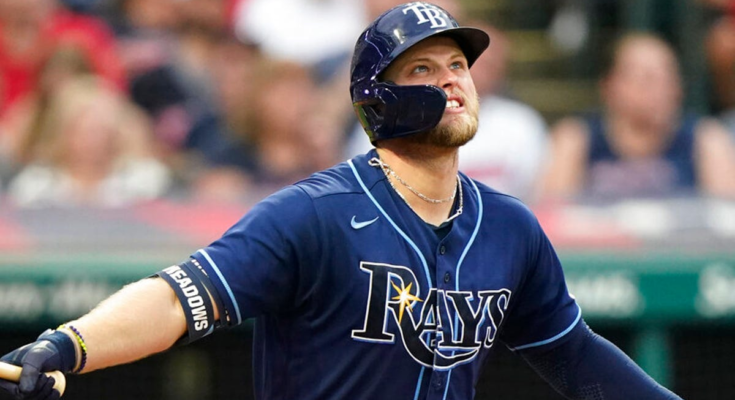
With their center-field depth a sudden threat, the Tigers moved Monday to add some overall outfield support when they traded with Tampa Bay, bringing Austin Meadows to Detroit in a one-for-one swap for infielder Isaac Paredes and a 2022 draft pick, which will be awarded just ahead of the draft’s third round.
Meadows, 26, was an All-Star in 2019, when he slammed 33 home runs and finished that season 14th in voting for the American League’s Most Valuable Player.
An oblique injury wiped out most of his 2020 season, but while his overall numbers dipped in 2021 (.234, .772 OPS), he still slammed 27 homers in 142 games.
The Tigers were intent Monday on adding a player who could bail out their outfield shortfall after Riley Greene, their rookie prize, was lost to a broken foot, and back-up center-fielder Derek Hill was shelved with a bad hamstring.
They opted for Meadows, who brings more security to their outfield platoon, at the expense of Paredes, 23, a multi-positional infielder whose bat has not blossomed as the Tigers had hoped.
Meadows is more of a corner outfielder than a player who can be trusted in center (18 big-league games there), but his relative versatility offers the Tigers freedom as they juggle their roster ahead of Friday’s season-opener against the White Sox at Comerica Park.
The Tigers had been torn between taking 15 position players and 13 pitchers, or 14 fielders and 14 pitchers, as they prepare to depart Lakeland on Wednesday for Detroit and for Opening Day.
With the sudden loss of Greene and Hill, the team was scrambling for serviceable outfield depth. So thin were trustworthy reserves that the Tigers were faced with the uncomfortable prospect of taking an infielder, Willi Castro, to Detroit as an outfield reserve.
That choice now is moot as the Tigers add Meadows, a former first-round pick (ninth-overall) by the Rays in 2013.

Of no debate is how Meadows’ arrival influences the Tigers’ plans for 2022. Greene, 22, and a player so talented he can be considered a franchise prospect, will be the Tigers’ regular in center once he returns from his damaged foot, which is expected in late May or early June.
Meadows figures to become part of a multiple-choice outfield arrangement that will include Victor Reyes and Hill – once he makes it back from his sore hamstring – as primary choices for Tigers manager AJ Hinch.
Paredes becomes the wild-card in Monday’s trade, all because his hitting talent could yet be tapped and evolve into the force the Tigers believed they were getting when he was acquired in a July, 2017, deal with the Cubs that also brought Jeimer Candelario to Detroit in exchange for Justin Wilson and Alex Avila.

Paredes was considered then to be a 19-year-old hitting prodigy who might offer the Tigers a reliable two-way presence at shortstop, or elsewhere in the infield.
But he quickly showed the Tigers that shortstop and his heavy-set build were not a match. More problematic was his bat, which did not evolve as the Tigers had hoped.
A lack of power, surprisingly low exit-velocities, and a developmental arc that seemingly might have hit its zenith early, became part of the Tigers’ strategy in trading Paredes.
Meadows, too, seemed to have plateaued for the Rays after his 2019 season when he batted .291, with a .364 on-base average, .922 OPS, and a stunning 33 homers.
The oblique injury appeared in 2020 to have brought on tougher, long-term times for Parker, who played in only 36 games in 2020 (.205, .667 OPS) ahead of his 2021 return when his numbers did not significantly improve.
Coincidentally, Meadows is now not the only of his family members employed by the Tigers. His younger brother, Parker, was a second-round pick by Detroit in 2018 and is an outfielder at the upper rungs of the Tigers’ system.
Lynn Henning is a freelance writer and former reporter with The Detroit News.


